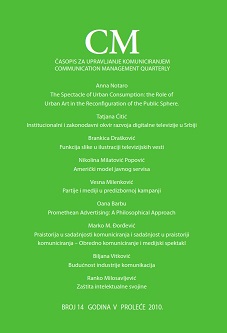Promethean Advertising: A Philosophical Approach
Promethean Advertising: A Philosophical Approach
Author(s): Oana Barbu KleitschSubject(s): Media studies, Social Philosophy, Theory of Communication, Behaviorism, Marketing / Advertising
Published by: Fakultet političkih nauka Univerziteta u Beogradu
Keywords: consumer society; advertising; communication; media culture; brand culture;
Summary/Abstract: In the wake of Gilles Lipovetsky’s theory on consumer behaviour in the contemporary era, with emphasis on his idea of hommo consumericus, this paper is going to focus on pointing out the structural transformations undergone by the (social) individual due to the exposure to the consumer society. The hommo consumericus concept is considered by more and more specialists to be characterized by an intimate and responsible consumerism, valued through brands and individual experience with the products; it means an emotional consumption process focused on the sensitive-valued dimension of branded products; and it means, as we will try to argue, the victory – on a metaphorical level – of Narcissus over Dionysus. It seems that nowadays we are facing a more responsible and vigilant Narcissus, a more self-aware character, paying more attention to the information he has selected, to his own image and his leisure time, concerned with the quality of his experience and his social and cultural medium. We are also taking into account the fact that advertising played for the consumer society (in the second phase of the consumerism, as described by Lipovetsky) a truly Promethean role by having success in communicating the contents of such diverse cultural and social groups. Therefore, this paper tries to reconsider, on one hand, the role played by the advertising phenomenon in the communication system as a whole, as well as its connection to the communication field – the unique way in which advertising develops its particular discourse in almost every medium. Furthermore, this way we encourage any point of view that could help us point out and confirm the interpretability of the advertising phenomenon. Nevertheless, communication theory speaks more and more about post-advertising, characterized by the versatility of the message, the predominance of the image, the lack of reference to the product, the active partaking of the public, and, most of all the conversion of the commercial stake into a socio-cultural activity.
Journal: CM Komunikacija i mediji
- Issue Year: 5/2010
- Issue No: 14
- Page Range: 143-154
- Page Count: 12
- Language: English

